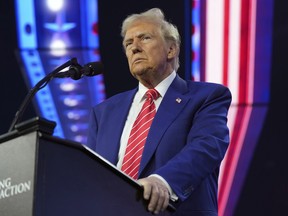Canada’s decision to expel Indian diplomats further postpones the signing of a trade deal, analysts say
Article content
India’s former High Commissioner to Canada once seemed positive about the two countries being able to strike a trade deal despite increasing tensions between the two countries.
In November, Sanjay Kumar Verma, one of six Indian diplomats expelled by Canada on Monday due to their alleged links to criminal activity, said that a potential trade deal between the two nations would take “only a couple of months” to complete once the Canadian federal government decided to “unpause” talks.
Advertisement 2
Article content
But a trade deal now seems many months away, according to experts following the issue, after Prime Minister Justin Trudeau on Monday said India had made a “fundamental error” by supporting criminal activity against Canadians.
“There was some real momentum behind the Canada-India trade front,” Xavier Delgado, a senior program associate at the Wilson Center, a Washington, D.C.-based think tank, said. “That was completely nicked by the eventual start of the dispute.”
Canada and India have been working on a trade deal since 2010, but discussions picked up in 2022 when Trade Minister Mary Ng visited India and the countries held several rounds of discussions.
Business leaders expected the two countries to then sign an early progress trade agreement (EPTA), which is considered a smaller version of the more comprehensive economic partnership agreement that Canada eventually wants to sign.
Businesses in Canada don’t necessarily need a deal with India to invest there, but a trade agreement provides reassurances that there are a set of rules that both countries will follow.
Article content
Advertisement 3
Article content
But trade deal talks were paused in September 2023 after Trudeau said Canada would pursue allegations of a potential link between India’s government and the killing of Hardeep Singh Nijjar, a Canadian citizen who headed Guru Nanak Sikh Gurdwara, outside a Sikh temple in Surrey, B.C.
The situation escalated on Thanksgiving Monday when the Royal Canadian Mounted Police commissioner Mike Duheme alleged that Indian government agents were linked to criminal activities, such as homicides and extortions, in Canada. Soon after, Ottawa expelled Verma and five other Indian diplomats.
The Indian government has rejected these claims.
This isn’t the first time relations between Canada and India have soured. India’s use of Candu reactor parts for its nuclear weapons in 1974 as well as its handling of the 1985 bombing of an Air India flight that killed 329 passengers, mostly Canadians, have also strained ties in the past.
After the latest episode on Monday, Ng tried to address any business fears by saying the government remains “fully committed to “supporting the well-established commercial ties” between Canada and India.
Advertisement 4
Article content
“However, we must consider our economic interests with the need to protect Canadians and uphold the rule of law. We will not tolerate any foreign government threatening, extorting, or harming Canadian citizens on our soil,” she said in a statement on Monday. “The Government of Canada remains open to a dialogue with India and we look forward to continuing our valued relationship.”
But segregating politics and business won’t be that easy, said Robert Fay, a senior fellow at the Centre for International Governance Innovation, a Waterloo, Ont.-based think tank.
“Canada has had a frosty relationship with India for some time, but now a winter storm is brewing,” he said in a statement. “It is Canada’s Indo-Pacific Strategy that really is at risk — all the more so because it is built upon engaging with a populous nation that has shared democratic values — something that might now be called into question.”
The Indo-Pacific strategy, released in 2022, was designed to play a critical role in shaping the country’s future over the next half-century. The region is the fastest-growing in the world and is home to six of Canada’s top 13 trading partners.
Advertisement 5
Article content
Through the strategy, Canada placed a “large bet” on India while looking to reduce its reliance on China, “another giant” with which Canada’s relations are frosty, said Fay.
“A key area to follow is how these most recent tensions affect Canada’s relationship with the broader Indo-Pacific community and China,” he said.
Another area to focus on would be to look at how the provinces are respectively dealing with India. For example, Saskatchewan recently opened an office in India to reflect the “reality that Saskatchewan exports to India,” Carlo Dade, the director of trade at the Canada West Foundation, a Calgary-based think tank, said.
Some of Canada’s major exports to India include coal, lentils, chemicals and minerals. Imports from India include jewelry, diamonds, shrimp and rice. Canada’s pension plans are also known to have invested billions of dollars in India.
Neither country is heavily reliant on each other, but Canadian business groups have been hoping to expand their relationship with India. Instead, international merchandise trade between the two declined by almost $1 billion from 2022 to 2023.
Advertisement 6
Article content
Recommended from Editorial
-

Business between Canada, India continues despite tensions
-

Trade policy hangs in the balance as Trudeau investigates India
That said, analysts hope the latest events don’t have a negative impact on the trade relationship.
“As frozen as it is now, I don’t think either country wants the trade relationship to get worse,” Delgado said. “That being said, the dispute causes uncertainty and that’s not good for business.”
• Email: nkarim@postmedia.com
Bookmark our website and support our journalism: Don’t miss the business news you need to know — add financialpost.com to your bookmarks and sign up for our newsletters here.
Article content
How Canada’s rising tensions with India might impact trade
2024-10-15 19:25:21






